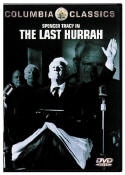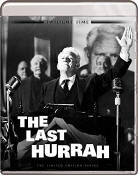The
Last Hurrah
|
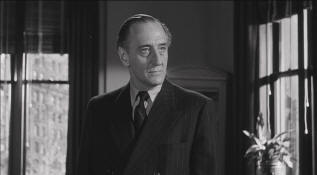 Cass fumes at being blackmailed by Skeffington. |
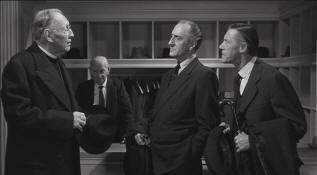 Cass and Force ask the Bishop to endorse McClusky for mayor. |
"Everyone’s good so it doesn’t make sense just to list them all, but Basil Rathbone’s great as a villain, Carleton Young as Tracy’s assistant, Dianne Foster as Hunter’s wife and Edward Brophy." —Andrew Wickliffe, The Stop Button
| Spencer Tracy in 'The Last Hurrah'; Portrays Skeffington; John Ford
Directs NOW that all key districts have been heard from, including Hollywood, it is safe to expect that Edwin O'Connor's highly touted political character, Skeffington, will repeat in an overwhelming landslide as the People's Choice this year. For John Ford and Spencer Tracy, who have engineered his campaign on the Coast with their motion-picture version of Mr. O'Connor's tub-thumping "The Last Hurrah," have delivered a smashing majority for the Irish-American political boss. And if this doesn't sweep him into office, there's no justice in a stuffed ballot box. Under Mr. Ford's fine direction of a script Frank Nugent prepared from Mr. O'Connor's novel (with an addition of some of his own bright Irish wit), the last political campaign of the old boy—and the last few weeks of his passage through this vale—are rendered robustly amusing and deeply touching. And Mr. Tracy is at his best in the leading role. ... With an evident affection for his subject amounting to sheer idolatry, Mr. Ford has put together a pungent pageant that gives all the breaks to Skeffington. When his hero recruits his young nephew to watch him through a mayoralty campaign, he easily convinces the young fellow—and perhaps the audience—that it's all a big game. When he graciously rides herd on his henchmen in a smoke-filled room or at a wake, it appears, from his genial behavior, that he is nothing but noble and good. And when he browbeats a group of stuffy Brahmins in their highly exclusive club, it sounds as if everybody is out of step but himself, Skeffington. Indeed, Mr. Ford (and Mr. Nugent) are so kind to him in this film that one searches in vain for a reason why anyone should think him a rogue. Much more evil and villainous in their manners are the anti-Skeffingtons—Basil Rathbone as a big-city banker and John Carradine as an editor. And his opponent in the mayoralty campaign—a role played by Charles Fitzsimmons—is made such a farcical nitwit that one is shocked and bewildered when he wins. Why should the movie audience be so much more perceptive than the electorate? But these things, and also an unconscionably long-drawn and liturgical death-bed scene, are balanced by the sly charm of the hero and the ebullience of his pals. Edward Brophy as a dopey idolater, Pat O'Brien as a sane strategist, James Gleason as a fast finagler and Ricardo Cortez as the guardian of the "Jewish vote" make things as merry for the audience as they do for Skeffington. Jeffrey Hunter is wholesome as the nephew, Dianne Foster is bouncy as his wife and Donald Crisp is authoritarian as a Catholic cardinal, Wallace Ford, Frank McHugh, Jane Darwell and Anna Lee are good in Irish roles. Maybe this is a sentimental and one-sided picture of a political boss, but there are things worse than having an opportunity for a good cry into a figurative bucket of beer. And that's what you get from this picture—that and a lot of laughs. ... Bosley Crowther — The New York Times, October 24, 1958 |
"Sentimental version of Edwin O'Connor's novel of politics, loosely based on life of Boston's mayor James Curley who in this story is mounting his final election campaign. Top-notch veteran cast makes film sparkle. Remade for TV in 1977 by (and with) Carroll O'Connor." —Leonard Maltin, Leonard Maltin's Classic Movie Guide (Penguin, 2015)
In addition to the 1977 television version of The Last Hurrah mentioned by Leonard Maltin, there was a stage version in 1999 produced by Boston's Huntington Theatre Company. See https://www.huntingtontheatre.org/about/history/1999-2000/The-Last-Hurrah/
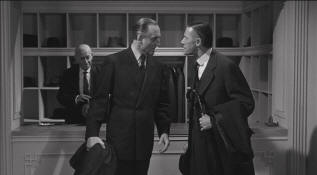 Cass and Force are annoyed that they failed to get the Bishop's endorsement. |
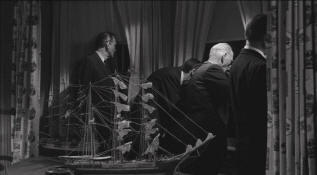 Skeffington's enemies watch a parade for Skeffington march by. |
"The election scene, moving from bustling confidence to cold defeat, is masterly." —The Monthly Film Bulletin, February 15, 1959
"This is a first-rate adaptation, taking most of the action and the dialogue straight from the book and making a very good book into a very good film." —Eric Beck, "Best Adapted Screenplay: 1958," Nighthawk News
|
The virtuosity with which producer-director John Ford handles actors, camera and film to achieve a particular effect has seldom had so wide a range as in this delightful, absorbing, warm and human study of a politician of the old school and the ould sod. Combined with the Ford magic is a Spencer Tracy performance, perfect in spirit and letter, which ranks with anything the old master has done in a long and distinguished career; and an astonishing list of co-stars and supporting players, each perfectly matched by the Ford genius to characters they portray. The list, long enough to crowd any marquee, includes Jeffrey Hunter, Pat O'Brien, Basil Rathbone, Donald Crisp, James Gleason, Diane Foster, Ricardo Cortez, Wallace Ford, Frank McHugh, Basil Ruysdael, Edward Brophy and John Carradine. The screen play by Frank Nugent is a perceptive translation of the Edwin O'Connor novel which recounts, through the eyes of a young sports columnist, the last torchlight and baby kissing campaign of an old-time political boss. The book, and the picture, depict a New England city and there are sufficient parallels to Boston to leave no doubt as to the prototype. However, the emphasis is universal rather than local and the story is of a unique era in American big city politics. Tracy is, of course, Frank Skeffington, the political rogue whose wit is ready, whose genius for organization has brought him to the peak of municipal politics, whose methods while not always ethical are certainly effective, but whose rough and ready "bossism" is rapidly disintegrating before modern but not necessarily better techniques. Tracy's portrayal, along with Ford's directorial genius, brings Skeffington to life with humor, in his philosophical approach to politics, pathos, in the personal tragedy of his widower loneliness and his disappointment in his playboy son, and magnificent defiance of the narrow, flint-hearted bankers and "proper" people who oppose him. The subordinate characters are sketched in a lower key but each is a gem of characterization with O'Brien and Cortez as John Gorman and Sam Weinberg, principal lieutenants; Jeffrey Hunter as Adam Caulfield, Skeffington's nephew who records the story; and Basil Rathbone and John Carradine as the banker and the vindictive publisher who are the mayor's principal enemies. The picture is dotted with other brilliant characterizations, typical of the Ford touch—Donald Crisp as the Cardinal, boyhood playmate of Skeffington who opposes his methods but in the end is reconciled with him; Jane Darwell as an Irish biddy whose hobby is attending wakes; and a host of minor characters each perfect in their parts. And several whole sequences will be talked about as gems of cinema art—Nocko Minehan's wake which Skeffington and his henchmen attend to comfort the widow and garner votes; Skeffington walking in the park alone in defeat while the victory parade passes him by; and the memorable deathbed scene. Ford's direction alternates between an impressionism which creates extraordinarily vivid pictures and a realism which gives the characters life and dimension. It is a picture destined for a long career in prestige for both Ford and Columbia and in box office dollars. James D. Ivers — Motion Picture Daily, October 15, 1958 |
"One of the principal pleasures of The Last Hurrah is its dynamite cast. I was genuinely surprised to learn that Spencer Tracy was not Ford's first choice as I can't imagine any actor more suited to the role of Frank Skeffington than him, and he plays it beautifully, passionate in his anger at Cass and his cronies but really shining in the small moments of realisation and understanding. John Carradine is suitably spiteful as newspaper editor Amos Force, but is outshone here by a perfectly cast Basil Rathbone, who expertly captures that self-interested callousness that defines so many of his ilk." —Slarek, Cineoutsider: Beyond the Mainstream
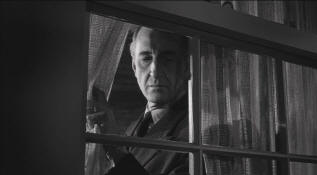 Cass watching the parade. |
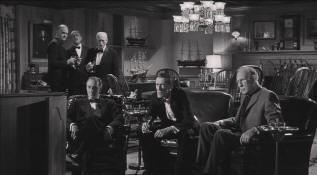 The Puritans watch Skeffington's concession speech. He announces that he's going to run for governor, and he expects to win. |
"Rathbone was excellent in the short, but impressive, role [as Norman Cass]. ... Pat O'Brien recalls that both the director and Tracy had a great admiration for Rathbone." —Michael B. Druxman, Basil Rathbone: His Life and His Films (South Brunswick and New York: A.S. Barnes, 1975)
|
Columbia's "The Last Hurrah" is certainly a refreshing film, if not a boxoffice smash. At its best moments, this John Ford production overflows with a warm-hearted gusto and rough-hewn eclat. And its star Spencer Tracy, gives a thoroughly irresistible taste of Boston blarney. He is playing, of course, that wonderfully flamboyant mayor people took to their hearts when reading the Edwin O'Connor best-seller of which this film is a pretty faithful transcription. The mayor is called Frank Skeffington and his politics are a picaresque sort indeed: a real old-guard city boss running for a fifth term, dandily dressed in homburg and chesterfield, smart as a whip a democratic Machiavelian who "knows what the people want and what they will settle for." Plainly this is a tarnished hero, but it is the theme of this film that something of dignity will vanish from the American scene when this breed dies out. Frank Nugent's barb-filled screenplay and John Ford's neatly nostalgic direction we get a perfect background for our hero. The screen is crowded with colorful characters, with the eccentricities and absurd rivalries between the "good" people and the "bad" taking on a vantage point in reality: that fine old city of Boston with its traditional free-for-all between the Irish-American wards and the Beacon Hill brahmins. from a fantastic Irish wake that turns into an affectionate political rally to a crackling invasion by Skeffington into the upper-stuffy Plymouth Club, where the hardened Yankees sit round their Founding Fathers table, and finally to a tautly realistic yet touching evocation of election night, "The Last Hurrah" brims over with rich and flavorful talk, finely atmospheric vignettes, just-plain-folks humor but done in the grand and frequently hilarious style of the old country and always a seemingly unending string of bravura performances form a large supporting cast that is really a delight. Pat O'Brien, James Gleason, Ricardo Cortez, Edward Brophy, Wallace Ford and Frank McHugh are grandly in tune as Skeffington's political sounding boards; Basil Rathbone, John Carradine and Willis Bourchey are nice and flinty as the aristocrats opposing him; and Donald Crisp, Basil Ruysdael and Ken Curtis are holy enough as men of the cloth who can't help liking him. Then there is also handsome Jeffrey Hunter as Skeffington's nephew, a naivete who learns that politics is the country's greatest spectator sport. As for the distaff side in a film which has little matinee trade appeal, we find pretty Diane Foster as Hunter's wife, Anna Lee as a stricken widow and Jane Darwell in a rollicking bit as one of those old-timers who make a hobby of funerals. Actually, however, there is a lack of real plot and romantic interest and these factors will restrict the film's chances in the general market. It is certain to do quite will in the family market. Whatever plot there is relies on the war between Skeffington and the snobs, his foxy tactics against them and his surprising defeat at the hands of one of their vacuous young candidates who used Madison Avenue techniques on TV. The grand old man has a stroke, dies and when one of his arch rivals says to him "you'd do it very, very differently if you had it to do over" he replies with a last smile: "Like hell I would!" — The Independent Exhibitor's Film Bulletin, October 27, 1958 |
"Frank did some questionable things but had good intentions behind them.
This made for an interesting take on politics, spinning a positive angle
on tactics that could be construed as dishonest or bullying. It’s also
portraying an interesting period of political history, when campaigns saw
a change in style, making use of TV which favours attractive, charismatic
candidates over those less ‘camera-friendly’ politicians possibly better
suited to the job at hand.
The performances are strong too, with Spencer Tracy delivering the goods
as usual, as the kindly but driven Frank. Rathbone and Carradine make
suitably venomous villains too and there are several classic character
actors from Ford’s troupe of regulars making appearances here and there."
—David Brook,
Blueprint: Review, April 15, 2020
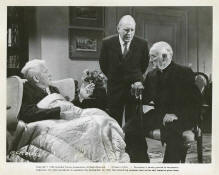 After Skeffington has a heart attack, he has a visit from the Bishop. |
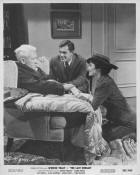 Adam and Maeve visit Uncle Frank, whose death isn't far off. |
"Tracy, eyes twinkling as he rides a cloud of ballyhoo, is very good indeed, and there are some class performances from Basil Rathbone, Edward Brophy and John Carradine." —Anthony Carthew, Daily Herald, December 27, 1958
Back to Page One. See Page Three for pictures of posters, lobby cards and promo photos.
|
The Last Hurrah is available
|
Images on this page and pages 1 and 3 are from the film "The Last Hurrah," copyright Columbia Pictures.









